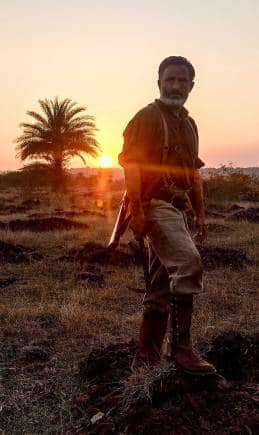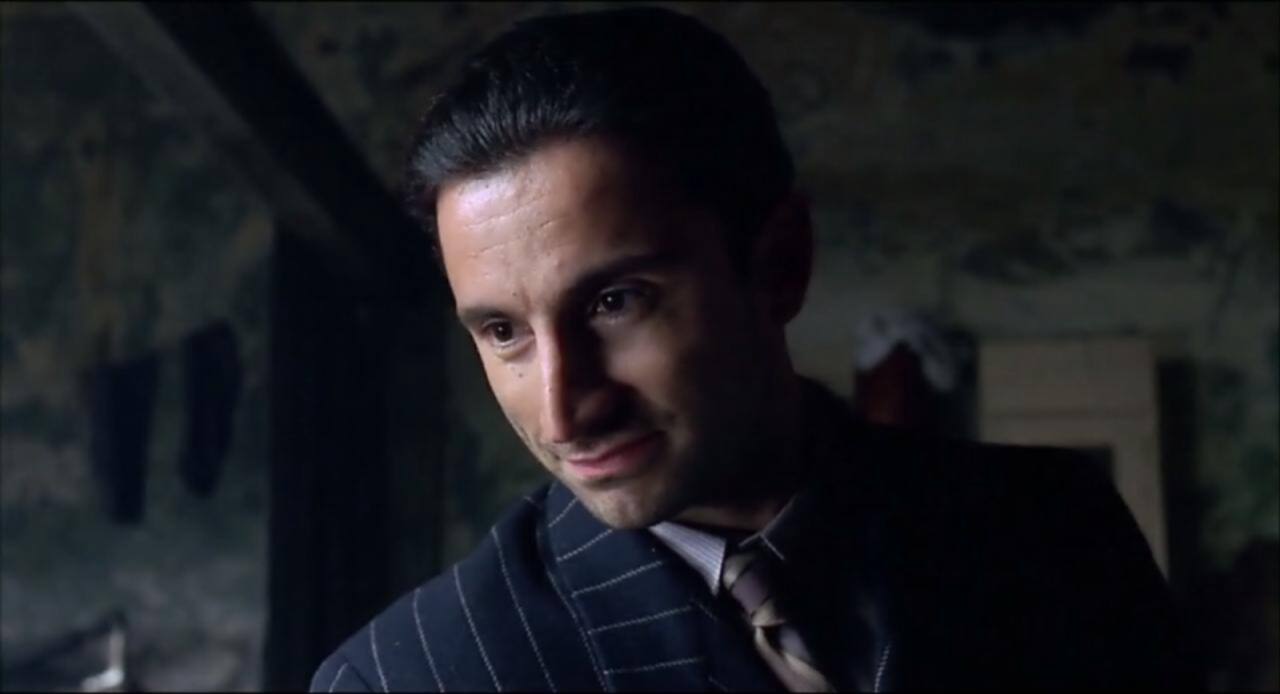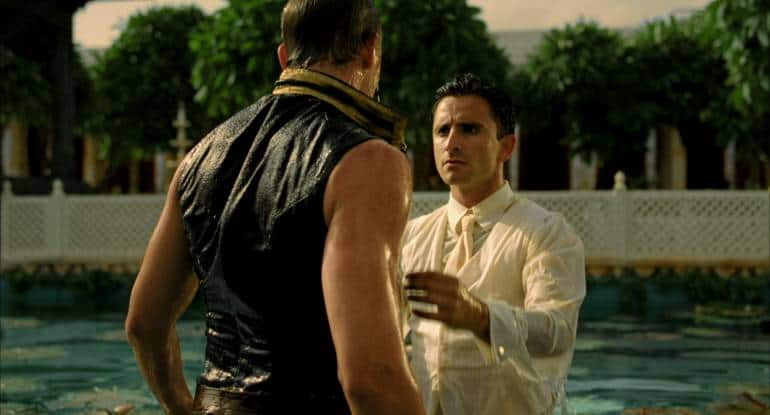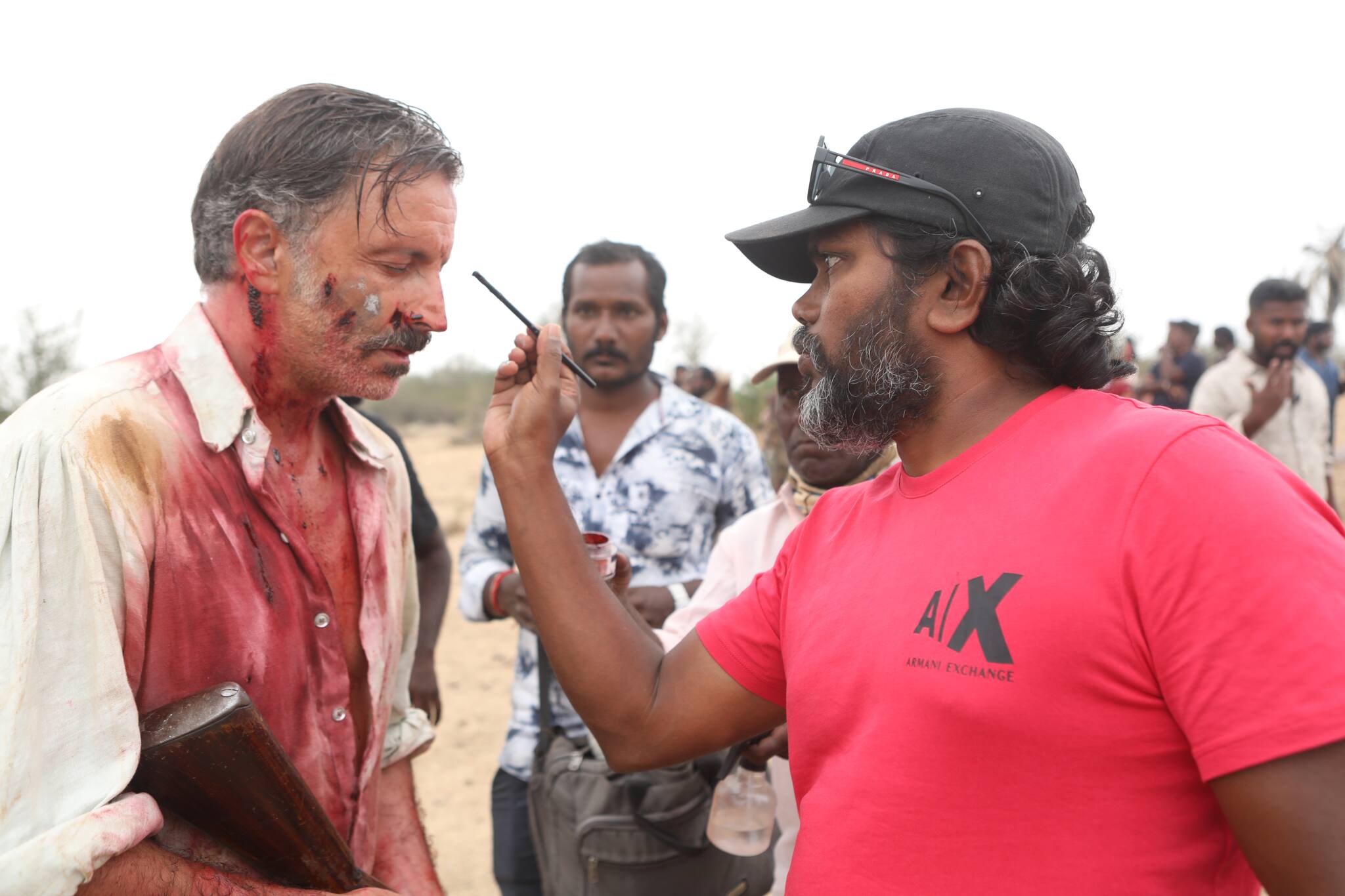



One would call it divine justice that an English actor would play a baddie in a film by an Indian, who were once colonised by the British. But what’s new in that? We’ve seen many such villains as cardboard cut-out archetypes, from Lagaan to RRR. Daniel Caltagirone (pronounced Kaltajironey) himself has played one, as the ingeniously named General Odious, in the highly underrated fantasy film The Fall by yet another Indian albeit a Hollywood director, Tarsem Singh, nearly two decades ago. So, Caltagirone wasn’t too keen on taking on the role of an antagonist until Pa. Ranjith told him that he’s playing the parallel lead opposite Chiyaan Vikram in his next, Thangalaan, which hits the theatres on India’s Independence Day, August 15.
Co-starring Parvathy Thiruvothu, Malavika Mohanan and Pasupathy, Caltagirone’s big Tamil debut is set in Kolar Gold Fields. Pa. Ranjith has said that he halted the production of his historical film Thangalaan after watching Kannada star Yash’s KGF films and resumed only after making massive changes. Thangalaan, with its cinematography and wild fight sequences, claims to be way more violent.
 A still from the film.
A still from the film.
Caltagirone, who can be seen in Hollywood blockbusters like Lara Croft: Tomb Raider, The Beach, Roman Polanski’s Oscar-winning The Pianist, period drama TV series like The House of Medici and The Tudors, in an episode of American sitcom Friends, has had direct and indirect associations with Indian cinema and has come to love okra. He was spotted at Royal Shakespeare Company by director Danny Boyle (who later made Slumdog Millionaire) and cast in the Leonardo DiCaprio-starrer The Beach, and a few years down the line, directors Shekhar Kapoor and Tarsem Singh would cast him in their films. In this interview, Caltagirone, who’s been on a nationwide tour with the cast to promote the film, speaks about all that and more. Excerpts:
Watch: Thangalaan actor Daniel Calatgirone interview on Moneycontrol
Did you ask Pa. Ranjit why he cast you in Thangalaan?
(Laughs) Yes, I did ask him. He’d approached my agent and asked about my past (military background) and what I could deal with. My agent told me that an illustrious filmmaker from India wants to work with me. Many of my Western counterparts have not had as many experiences as I have with Indian filmmakers. I’ve worked with Shekhar Kapoor (The Four Feathers, 2002) and Tarsem Singh (The Fall, 2006), although Tarsem is an Indian born but Americanised big Hollywood director. But still, this (Pa. Ranjith) is my third Indian director, so, I was intrigued.
When I watched Madras (2014), Sarpatta Parambarai (2021), Kaala (2018), just to see what he was like as a filmmaker, I was blown away. He’s a very powerful social commentator and his style of filmmaking is visceral, energised, and exciting. I was sold, I hadn’t even read the script and I’ve never done that in my life.
But I told Ranjith, I was not interested in doing a clichéd British colonialist officer, hitting an Indian villager on the head with a stick. He said, no, this is a parallel lead. That was kind of unusual in India. He needed me to find levels in this character. He wanted a Western actor who’s got an established CV and reputation, and he knew I’d been in big Hollywood films. Though he was nervous about hiring a Western actor because unsure if they would understand how Indian filmmaking worked and whether they would have the physicality to endure this kind of hard filmmaking. And it was very hard filmmaking.
You’ve called Pa. Ranjith India’s Spike Lee and a little bit of Quentin Tarantino. Could you elaborate?
Just look at Madras, I remember thinking there was an element of Spike Lee. Ranjith is a renowned, powerful social commentator. He’s very political. There are similarities with Lee, who talks about the community he comes from and the struggle, the racial elements are very strong there. It’s the same with Ranjith talking about caste system and freeing people of that. And Sarpatta... became a little bit Tarantino-esque. On the set, I asked Ranjith whether he loves any Western filmmakers, and the first thing that came out of his mouth was ‘I’m a big fan of Spike Lee.’ I knew it. Good filmmakers will always respect other good filmmakers, look at their work and be influenced by that. In terms of Indian filmmakers, Ranjith is supremely interesting. I hope Thangalaan is a continuation of his amazing work.
Were there any villain or anti-hero stereotypes in the script? What kind of physical and mental transformation you underwent for the role?
Well, interesting that you used the word villain because that’s exactly what Pa. Ranjit did not want. Even RRR had a typical British villain. When we talk about villain, we think about a big moustache (gestures and laughs). Ranjith wanted a human being who is a decent man but ends up becoming obsessed and overpowered by this desire and need to support his family and enrich his life. Greed becomes infectious. But Ranjith said there are no villains and no redemptive characters in this piece. Thangalaan, played by my co-star Vikram, and my character Clement are different sides of the same coin. Everyone has got their bad points and that’s fascinating. I had to demonstrate levels, I’m not a one-dimensional baddie but a fully rounded character… and the editing is good. They show moments of vulnerability, emotional outpouring and the sense that he truly does care about his family but ends up becoming corrupted.
I did my research on KGF (Kolar Gold Fields) and colonialism. For my character, an army officer in the late 1800s, I didn’t want to make him into your archetypal high-status British but make him slightly rough around the edges because, in my head, he’s in the establishment but is an outsider, who’s looked down upon.
Ranjith needed me to physically dominate the space. I’d decided to put on weight, I started to eat a lot of pasta. Once I hit India, I was gorging on every incredible dish in Tamil Nadu. Stuffing my face with all the Indian desserts, the fried fish and lemon rice. I love okra fingers in the sauce with a bit of chilli. I’d put on a stone and a half in weight (22 lbs/10 kg). When you see Clement on screen, you’ll see I’m very heavy, but it gives more of a powerful presence. I liken Clement to a bull in the field, a bull that is very calm and still until you aggravate it and then it comes charging at you. The tricky part was to lose all that weight after I’d finished the film.
British actors are usually restrained and naturalistic while there’s a certain theatricality in Indian films. You’ve dabbled in theatre at Royal Shakespeare Company but how much did you push yourself to fit in?
I was laughing when you were saying it because that was one of my big issues. The first two-three weeks I had a real problem on set. Ranjith would say into his microphone, ‘Daniel, bigger, more, louder.’ I would tell him that I’m overacting. He’d say, ‘no, trust me.’ I just couldn’t get my head around it because I’ve spent all my life doing the very laid-back American style of naturalistic acting. One day, I got really angry and Ranjith called me to the monitor to show me the rushes. Once I watched myself, I understood that I was fitting in with everyone else. Because of the fantastical nature of the story, it didn’t look out of place. My co-stars Vikram, Parvathy, Malavika, Pasupathy really helped me embody this world and understand the different style. After that, I was like a train on the rails. But it was really a hard process. The problem was I had one eye on my Western colleagues and that was messing my head up, I was thinking, they’re going to be looking at me and going, ‘oh, my God, that’s ridiculous’. So, once I got rid of those thoughts, I was really enjoying it.
 (Clockwise from left) Pa. Ranjith, Daniel Caltagirone, Chiyaan Vikram, Malavika Mohanan and Parvathy Thiruvothu.
(Clockwise from left) Pa. Ranjith, Daniel Caltagirone, Chiyaan Vikram, Malavika Mohanan and Parvathy Thiruvothu.
What was your chemistry with Vikram on the set, what kind of things did you talk about?
I was very fortunate and a bit concerned. I was the only British actor on the film and worried how they would accept me. The first two actors I met were Chiyaan Vikram and Parvathy, and they were so welcoming, gracious, lovely and sweet, it was a relief. Once we started filming, I realised really quickly that my relationship with Vikram was easy. We work in very similar fashion. We worked beyond our capability, even if we were very tired and hadn’t slept or were cold or hungry, we still pushed the boundaries. We got to a point where we understood each other, we didn’t even have to speak about what we wanted to do. I would look at him, maybe do a hand signal and he would do something back. I don’t know how we got into that headspace, but it was a very psychic relationship.
Between Adrien Brody, Heath Ledger, Leonardo DiCaprio and Vikram, who has been the most fun co-star?
(Seems to choke on water, coughs and smiles) I’ve been very lucky to have worked with all these big actors. We all did some crazy things together. I had an absolute blast with Leonardo DiCaprio (on The Beach) in Thailand. But in terms of a closer friendship, because of what we were going through on a powerful, important film (The Pianist), in Poland, it was Adrien Brody. It was important to us that we served the script really well. With Chiyaan, it was fun but we were in the middle of nowhere, we couldn’t go party. It was more of a bonding experience on Thangalaan and our bonding came out of the difficulty of filming, of being tired, working hard and pushing ourselves. We would just enjoy each other’s company, sit together and talk about the film, our lives, our dreams and ambitions.
 Daniel Caltagirone in a still from 'The Pianist'.
Daniel Caltagirone in a still from 'The Pianist'.
What was it like working with Roman Polanski on The Pianist?
Well, it was a bit like the experience with Pa. Ranjith, where you see the whole crew absolutely respect the director and do anything for the director. Polanski was such a legend at the time, and one of my favourite directors while growing up. I’d obviously watched Chinatown (1974) and Rosemary’s Baby (1968). He’s an extraordinary filmmaker, and his films, regardless of what happened in his personal life [convicted of raping a minor], and I don’t condone any of that, but regardless of his personal life which has been very black, as an artist/filmmaker, his films have been in the ‘top hundred films of all time’ lists. I already had that admiration for him as a director. When I got a call from him, I was half asleep and I thought it was a prank by my friends, so, I cut the call. But he called back to offer me a role in The Pianist. When I eventually met him as an artist, he was second to none. He controlled that set completely and knew exactly what he wanted. Also, he’s a very good actor. He comes from theatre and used to be an actor before he was a film director. He’s done a few cameos [with Jack Nicholson in Chinatown]. Unlike other directors, instead of explaining what he needed from us actors in a shot, Polanski would act it out, and Adrien and I would be [anxious]… that we’ve got to do it better than that. We always had to be on our A-game.
I’m very sad that the conversation about him is always about this thing that happened in his early days. It is what it is, unfortunately. But I don’t condone any of his behaviour in the past. It’s an interesting question, isn’t it? Do we stop judging someone as an artist and then as a human being? I’ve thought about this a lot, that if we’re going to judge artists in terms of their human behaviour, then we can pretty much get rid of most of art in human history, whether it be from India, Italy, America, England, France, Spain. Artists are complicated creatures. Look at Michelangelo, Picasso, etc. Do we whitewash history and say they don’t exist? That’s a question I ponder all the time. Obviously, there’s a red line and there’s some very dark characters out there I would have nothing to do with. But all I do know is that this is something I find really disturbing. As artists and as human beings, we have stopped listening to each other. If I don’t like your views, now in this current society, then you’re blacklisted. Everyone’s in an echo chamber. I can’t function like that. If we don’t respect others with views different from ours, we’re going to go to war again and again.
 Daniel Caltagirone (right) in a still from 'The Fall'.
Daniel Caltagirone (right) in a still from 'The Fall'.
When Tarsem Singh’s fantasy film The Fall (2006) had released, critics panned it, Roger Ebert called it ‘a mad folly’. It’s only now that cinephiles are discovering it. What happened?
When you’re looking at a film, you’re looking at the commercial aspects of it. I’ve always said about Tarsem’s The Fall, it’s a big canvas of art and the fact that it’s moving, that it’s neither here nor there, makes it a piece of art. It’s so beautiful and stunning with its wonderful, rich landscape and rich characters. At the time, it wasn’t conventional enough. People didn’t really understand it. But let me tell you now, of all the things I’ve done, films and everything else, that is the film I’m very proud to have been a part of. I remember being in the middle of a village in Spain and a 20-something Spanish guy tapped on my shoulder to say, ‘I absolutely love The Fall? I’m a film student and we studied it.’ That kept repeating…in Los Angeles, Rome, Thailand. This is an extraordinary film. The reason why it’s shown in so many film schools is because when you watch it, you think that there’s CGI, but there’s no CGI in the film. Look at what you can do if you have a vision. Breaking conventionality is another thing. It’s weird, but you’re right, it took so long, around 15 years to start getting this sort of feedback, it’s amazing.
 British actor Daniel Caltagirone with Tamil director Pa. Ranjith on the sets of 'Thangalaan'.
British actor Daniel Caltagirone with Tamil director Pa. Ranjith on the sets of 'Thangalaan'.
SS Rajamouli’s RRR has changed the Western perspective of Indian cinema by taking it beyond Bollywood. Though it can be a trap where Indian cinema is seen as potboilers, whether Bollywood song-and-dance or Rajamouli’s epic entertainers. There’s so much more. But do you see this as a positive change?
Yes, I do. There’s a couple of things. What the audience liked about RRR was that it was epic filmmaking. We don’t do epic filmmaking in the West anymore. Maybe Interstellar (2014). Rajamouli has done it, made an epic film. It’s touched a nerve somewhere. But my only concern is this, the West is not very well educated about Indian cinema. And they don’t understand that it’s not just Bollywood and singing and dancing. And as much as I loved RRR, my concern is the thinking that ‘we love this, we want more of this’. I keep trying to explain to everyone in the West, it’s not just Bollywood. There’s Tollywood, Kollywood, there are other woods out there. And there’s serious filmmaking, and RRR is a serious film, but the point I’m trying to make is there are small-budget films, there are films about local issues, social identity, on really sensitive subjects, and subtle films. People don’t understand that outside India. But the only way they’re going to understand is to keep doing what Ranjith’s done, bring in a Western actor. Also do storylines that are not just the colonialists, not just the army officer, why can’t a British actor come and play a romantic lead in an Indian movie? We have Indian actors in our films. Look at Deepika (Padukone), there’s no question about her being Indian. Once more Indian filmmakers start looking [outside] and the Indian film doesn’t become India-centric, then it’s going to be, hands down, the most powerful industry in the world filmmaking. I don’t think as an industry, Hollywood will be able to compete. And nearly everyone I speak to in India, understands a form of English. So, language doesn’t make a difference. I want to be the first to say that India’s on the verge of becoming the most powerful film industry in the world, because you guys have still got cinema, whereas we’ve lost cinema in the West. Streaming has killed our film.
 A BTS still of Daniel Caltagirone with Pa. Ranjith (right) on the sets of 'Thangalaan'.
A BTS still of Daniel Caltagirone with Pa. Ranjith (right) on the sets of 'Thangalaan'.
Do you get a song and dance sequence in the film?
If only! That would be my dream come true… to do a Bollywood movie, where I get to dance. I recently saw the Deepika-starrer Fighter. I was on a plane and I was bored. What really struck me was the song Sher Khul Gaye. I wanted to be in that video. This is where Indian cinema is so extraordinary that you guys can have a serious film and then suddenly have a dance sequence with a song, and do audio launch for it. I love that element of it.
One thing to watch out for in Thangalaan?
The ending. We all had shot the film’s ending, said our goodbyes and went off after nearly a year of filmmaking. Then I got a call two months later from Ranjith asking me to return to India. He said he’s got a new ending. That he’s got another idea…a better ending. I found that crazy. But we all went back for it. So, definitely keep an eye out for the ending. It’s a mad ending but a very powerful climax to this whole story. Also look out for the mad, mad fight sequences.
Discover the latest Business News, Sensex, and Nifty updates. Obtain Personal Finance insights, tax queries, and expert opinions on Moneycontrol or download the Moneycontrol App to stay updated!
Find the best of Al News in one place, specially curated for you every weekend.
Stay on top of the latest tech trends and biggest startup news.